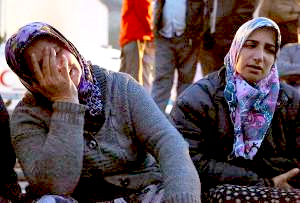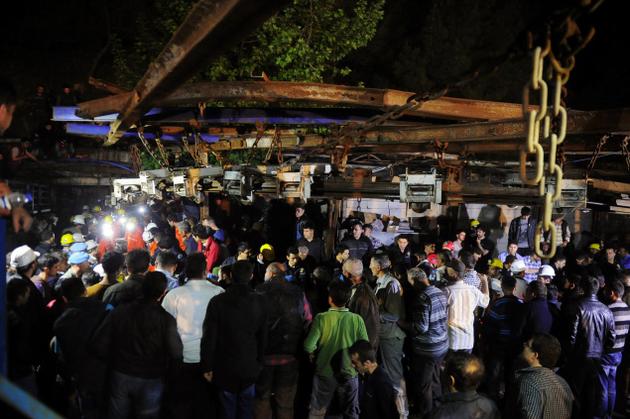 Soma/Turkey, May 15: In a relentless procession that ignited wails of grief, rescue workers coated in grime lumbered out of a mine in western Turkey again and again Wednesday, struggling to carry stretchers laden with bodies covered in blankets.
Soma/Turkey, May 15: In a relentless procession that ignited wails of grief, rescue workers coated in grime lumbered out of a mine in western Turkey again and again Wednesday, struggling to carry stretchers laden with bodies covered in blankets.
The corpses' faces were as black as the coal they worked on daily. There were 274 of them - and the fate of up to 150 other miners remained unclear in Turkey's deadliest-ever mining disaster.
While emergency workers battled a toxic mix of carbon dioxide and carbon monoxide in deep underground tunnels to try to find survivors, anger and despair engulfed the town of Soma, where Turkish officials said at least 274 miners died in Tuesday's coal mine explosion and fire.
Tensions were high as hundreds of relatives and miners jostled outside the mine's entrance on Wednesday, waiting for news. They were countered by a heavy police presence.
Rows of women wailed uncontrollably and men knelt sobbing or just stared in disbelief as rescue workers removed body after body. To let off steam, some heckled Turkish officials, including Prime Minister Recep Tayyip Erdogan, as they passed by.
Energy minister Taner Yildiz said 787 people had been inside the coal mine at the time of Tuesday's explosion: 274 had died, 363 had been rescued and scores of them were injured.
The death toll topped a 1992 gas explosion that killed 263 workers near Turkey's Black Sea port of Zonguldak.
It also left 150 miners still unaccounted for. Erdogan said on Wednesday morning that 120 miners were still missing. There was no immediate way to reconcile the differing figures.
Rescuers were still trying to vent out the carbon dioxide and carbon monoxide and pump clean air into the mine, according to mine owner Soma Komur Isletmeleri A.S.
Yildiz said rescue workers were trying late Wednesday to reach the bodies of 20-22 people trapped in one specific zone. Some of the workers had been up to 420 meters (460 yards) deep inside the mine, he said.
One elderly man wearing a prayer cap wailed after he recognized one of the dead, and police had to restrain him from climbing into an ambulance with the body. An injured rescue worker who emerged alive was whisked away on a stretcher to the cheers of onlookers.
The last worker rescued alive emerged from the mine around dawn, a government official said, speaking on condition of anonymity because she didn't have authorization to talk to journalists.
The anger boiled over into violent protests in Soma, Istanbul and the capital, Ankara, all directed at Erdogan and his government.
Giza Nergiz, a 28-year-old English teacher, said some of the workers who died had complained about safety at the mine.
"We buried three of our high school friends today,'' she said, walking with her husband Onur Nergiz, a 30-year-old mine administrator. ''A lot of people were complaining about safety, but nobody (in management) was doing anything about it.''
The first burials took place on Wednesday. Earlier, Erdogan said that families were being asked to identify the bodies of loved ones from photographs.
Erdogan had declared three days of national mourning and postponed a trip to Albania to visit the mine in Soma, about 250 kilometers (155 miles) south of Istanbul. Erdogan is widely expected to run for presidency in elections in August, although he has not yet announced his candidacy. He warned that some radical groups would try to use the disaster to discredit his government.
''Our hope is that, God willing, they will be brought out,'' Erdogan said of those still trapped. ''That is what we are waiting for.''
Yet his efforts to appear statesman-like-discussing rescue operations with authorities, walking near the mine entrance to comfort two crying women-fell on deaf ears. In this industrial town, where coal mining has been the main industry for decades, Erdogan's ties to mining leaders were sharply noted. Locals said the wife of the Soma mine's boss reportedly works for Erdogan's party, and the boss himself had skipped town.
Erdogan has also appeared less-than-sympathetic to the plight of miners in the past, saying in 2010 that death was part of the ''profession's fate'' after 30 miners died.
''They are trying to look like they care but they are not helping anyone. There is no urgency, even now. People blame Tayyip (Erdogan),'' Giza Nergiz said on Wednesday.
In downtown Soma, protesters mostly in their teens and 20s faced off against riot police in front of the ruling NKP party headquarters. The protesters smashed the party's office windows with rocks and some in the crowd shouted that Erdogan was a ''murderer!'' and a ''thief!''
''Our prime minister is a dictator,'' said protester Melih Atik, 16. ''Neither the government nor the company took precautions in the mine and everyone knows that's why this happened.''
In Istanbul, hundreds of demonstrators gathered outside the headquarters of mine ower Soma Komur Isletmeleri A.S. Police used tear gas and water cannon to break up a group who tried to march to the city's iconic Taksim Square to denounce poor safety conditions.
Police also dispersed a group marching to the energy ministry in Ankara to protest the deaths, the Dogan news agency reported.
Fences were erected and police also stood guard around Soma hospital, which was treating scores of injured miners. Some locals said the men were being pressured by the mining company not to talk.
Authorities say the disaster followed an explosion and fire at a power distribution unit and the deaths were caused by carbon monoxide poisoning. Erdogan promised the tragedy would be investigated to its ''smallest detail'' and that ''no negligence will be ignored.''
Mining accidents are common in Turkey, which is plagued by poor safety conditions. Tuesday's explosion tore through the mine as workers were preparing for a shift change, which likely raised the casualty toll.
Turkey's labor and social security ministry said the mine had been inspected five times since 2012, including two months ago in March, and that no issues violating work safety and security were detected. But the country's main opposition party said Erdogan's ruling party had recently voted down a proposal to hold a parliamentary inquiry into a series of small-scale accidents at the mines around Soma.
Emine Gulsen sat with other women on Wednesday near the entrance to the mine, where her missing son, 31-year-old Mehmet Gulsen, has been working for five years.
''My son is gone! My Mehmet!'' she wailed over and over.
But Mehmet's aunt, Makbule Dag, still held out some hope.
''Inshallah (God willing)'' he will be rescued, she said.
Earlier:
201 dead, many trapped in Turkish coal mine

Soma/Turkey, May 14: Turkey's Energy Minister Taner Yildiz on Wednesday said the death toll from an explosion and fire at a coal mine in western Turkey is now 201.
Mr. Yildiz said 80 mine workers were injured and at least four of them are in serious condition.
The accident in the mine in the town of Soma some 250 km south of Istanbul is one of the worst mining disasters in Turkish history.
Rescuers were struggling early Wednesday to reach more than 200 miners still trapped inside the coal mine. More than 360 workers have been evacuated so far.
Mr. Yildiz said the rescue effort is “reaching a critical stage” with the death toll likely to rise as time passes.
The accident occurred when the workers were preparing for a shift change, officials said, which likely raised the casualty toll because there were more miners inside than usual.
Mr. Yildiz said the deaths were caused by carbon monoxide poisoning.
Authorities say the disaster followed an explosion and fire caused by a power distribution unit.
Nurettin Akcul, a mining trade union leader, told HaberTurk television that Turkey was likely facing its worst mining accident ever.
“Time is working against us. We fear that the numbers could rise further,” Mr. Yildiz said. “We have to finish this (rescue operation) by dawn. I have to say that our pain, our trouble could increase.”
Earlier Mr. Yildiz said some of the workers were 420 metre deep inside the mine. News reports said the workers could not use lifts to get out of the mine because the explosion had caused a power cut.
Television footage showed people cheering and applauding as some trapped workers emerged out of the mine, helped by rescuers, their faces and hard-hats covered in soot. One wiped away tears on his jacket, another smiled, waved and flashed a “thumbs up” sign at onlookers.
Authorities had earlier said that the blast left between 200 to 300 miners underground and made arrangements to set up a cold storage facility to hold the corpses of miners recovered from the site.
Prime Minister Recep Tayyip Erdogan postponed a one-day visit to Albania scheduled for Wednesday and planned to visit Soma instead.
One woman threw herself on the ground, crying after hearing about the death of a loved one, HaberTurk television showed. There were tears of joy for another who told the station she had just spoken by telephone to a missing relative.
Police set up fences and stood guard around Soma state hospital to keep the crowds away.
SOMA Komur Isletmeleri A.S., which owns the mine, said the accident occurred despite the “highest safety measures and constant controls” and added that an investigation was being launched.
“Our main priority is to get our workers out so that they may be reunited with their loved ones,” the company said in a statement.
Turkey's worst mining disaster was a 1992 gas explosion that killed 263 workers near the Black Sea port of Zonguldak.






Comments
Add new comment